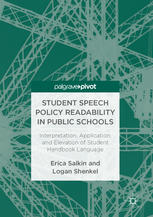

Most ebook files are in PDF format, so you can easily read them using various software such as Foxit Reader or directly on the Google Chrome browser.
Some ebook files are released by publishers in other formats such as .awz, .mobi, .epub, .fb2, etc. You may need to install specific software to read these formats on mobile/PC, such as Calibre.
Please read the tutorial at this link: https://ebookbell.com/faq
We offer FREE conversion to the popular formats you request; however, this may take some time. Therefore, right after payment, please email us, and we will try to provide the service as quickly as possible.
For some exceptional file formats or broken links (if any), please refrain from opening any disputes. Instead, email us first, and we will try to assist within a maximum of 6 hours.
EbookBell Team

5.0
20 reviewsThis book explores the issue of student speech in public schools from a student usability perspective. Student speech is both a challenge and an opportunity in public schools. When school boards and districts craft policy, they do so with US Supreme Court precedents, state laws, and community expectations in mind. The result is complex ideas presented in complex speech. What do student handbooks say about free speech, if anything at all? How are these rights defined, and how is the language interpreted? Salkin and Shenkel explore these questions by analyzing a sample of public high school student handbooks from across the country. Drawing from the results, the project proposes real-world suggestions for schools seeking to create student expression handbook language that is easily accessible to the audience it seeks to serve.